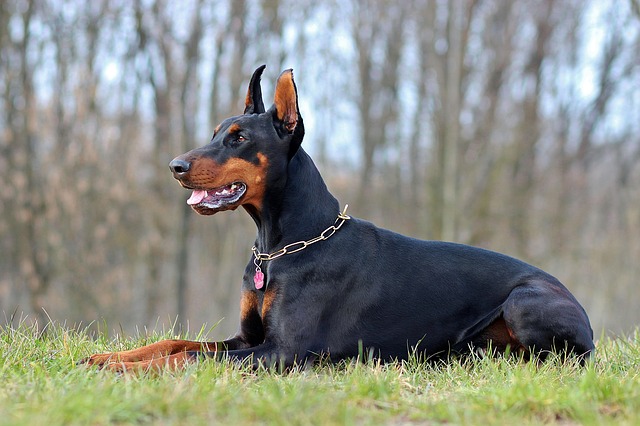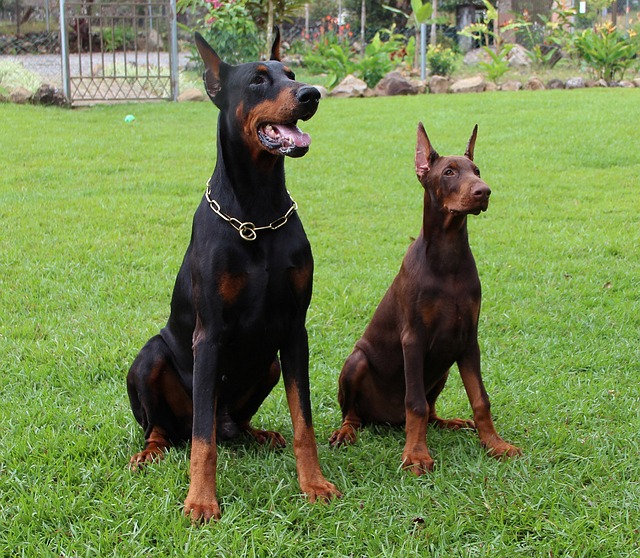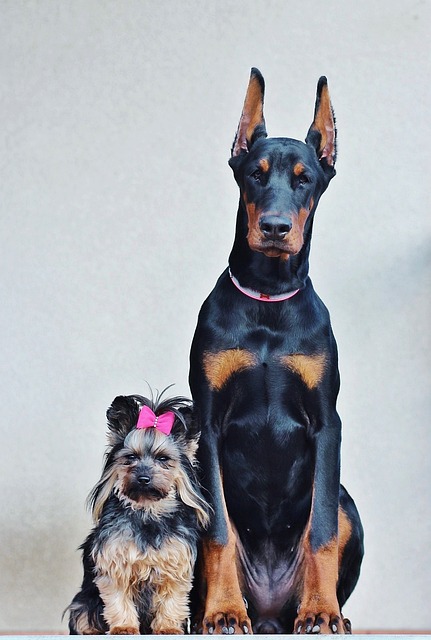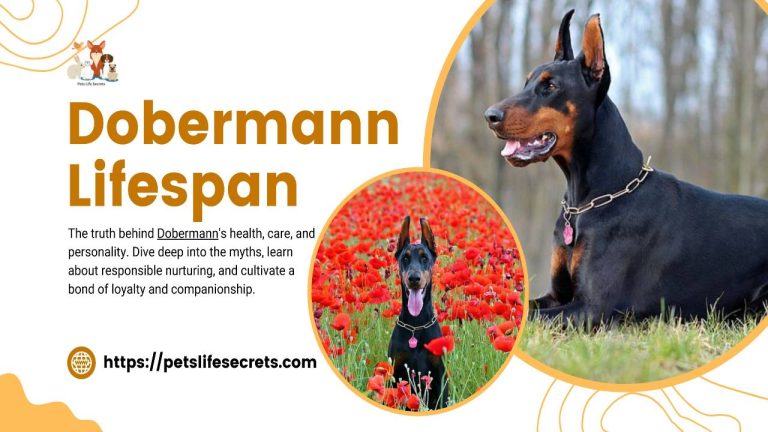Unlock the truth behind Dobermann‘s health, care, and personality. Dive deep into the myths, learn about responsible nurturing, and cultivate a bond of loyalty and companionship.
Unraveling the Dobermann Pinscher: Debunking Misconceptions and Unveiling Reality
The Dobermann Pinscher, often simply referred to as the Dobermann, is a well-known dog breed that has garnered both attention and controversy throughout the years. This breed’s reputation, unfortunately, has been marred by myths and misconceptions, some stemming from historical events like world wars. In this article, we will delve into the true nature of the Dobermann, its origins, temperament, and health, dispelling the myths that have unfairly plagued this remarkable canine companion.

A Brief Historical Overview
To truly understand the Dobermann, we must travel back to the 1800s in Germany, where a man named Karl Friedrich Louis Dobermann had a unique profession as a “tax collector.” Seeking a loyal companion with specific guarding and protection skills, Dobermann is believed to have meticulously crossed various breeds including Weimaraner, Manchester Terrier, German Shepherd, Great Dane, German Pinscher, and Rottweiler. The result was the Dobermann or Doberman Pinscher—a breed renowned for its intelligence, athleticism, and loyalty.
Challenging Myths and Misconceptions
The Dobermann’s appearance, often associated with its imposing stature, has led to a series of unfounded myths. One such myth suggests that these dogs become aggressive and unstable after a certain age due to skull-related issues. Another absurd claim is that they lose their sense of smell and become aggressive towards their owners. These misconceptions hold no scientific basis and are largely a product of human speculation.
The Real Personality of a Dobermann
Contrary to popular belief, the Dobermann is an affectionate, intelligent, and loyal breed. They form strong bonds with their owners and are known for being wonderful companions. The Dobermann’s behavior largely depends on how they are raised, socialized, and trained. With proper care and socialization, they get along well with other pets and even children.
Nurturing Your Dobermann’s Well-Being
Caring for a Dobermann requires attention to their health and well-being. While the breed may be prone to certain genetic conditions like hip dysplasia and cardiac issues, responsible breeding and regular veterinary visits can mitigate these concerns. Nutrition plays a vital role, especially during the puppy stage, where a balanced diet contributes to proper growth and development. Regular exercise and socialization are also crucial to maintaining a happy and healthy Dobermann.
Addressing the Stigma and Fostering Positive Ownership
Sadly, misconceptions and stigma continue to surround the Dobermann breed. Being informed and responsible is key to fostering positive ownership. Engaging in proper training, socialization, and seeking guidance from reputable breeders can lead to a harmonious and fulfilling relationship with your Dobermann. Remember, a well-cared-for Dobermann is a wonderful addition to any family.
A Closer Look at the Dobermann’s Health, Care Needs, and Personality Traits
The Dobermann Pinscher, often simply known as the Dobermann, is a captivating breed that has captured the hearts of many. Beyond the myths that surround it, this breed boasts a fascinating blend of health considerations, care requirements, and distinctive personality traits. In this article, we will delve deeper into these aspects to provide a comprehensive understanding of what it means to embrace a Dobermann as a beloved family member.

Click Here For: Adopting a Saint Bernard Puppy: A Guide To Their History, Characteristics, Care, And Nutrition
Prioritizing Health and Wellness
As with any living creature, the health of a Dobermann is of paramount importance. This breed, though robust, can be susceptible to specific genetic conditions that warrant careful attention. Conditions like hip dysplasia, arthritis, and dilated cardiomyopathy have been noted within the breed. To ensure the well-being of your Dobermann, partnering with a reputable breeder who prioritizes health screenings and responsible breeding practices is essential.
A Nutritional Journey
Proper nutrition plays a pivotal role in the life of a Dobermann. From puppyhood to adulthood, the right balance of nutrients is crucial for healthy growth and development. Special consideration should be given to large-breed puppy formulas during the early stages, as rapid growth needs to be managed to avoid potential joint issues. Consultation with a veterinarian is recommended to determine the best dietary plan that aligns with your Dobermann’s individual needs.
Nurturing a Distinctive Personality
The Dobermann’s personality is an intriguing mix of loyalty, intelligence, and affection. They are often fiercely loyal to their guardians and thrive on forming strong bonds. Contrary to the misinformed perception of aggression, Dobermanns are incredibly loving companions when raised in a nurturing environment. Their intelligence makes them receptive to training and learning, allowing them to excel in various roles, from loyal family pet to service dog.
Socialization: The Key to Harmony
Socialization is a cornerstone of nurturing a well-rounded Dobermann. Starting from an early age, exposing your furry companion to various environments, people, and animals helps foster confident behavior. Dobermanns, when properly socialized, can coexist harmoniously with other pets and even children. Their innate guardian instincts remain intact, making them an excellent choice for families seeking a protective yet loving companion.
Click Here For: Adopt Bloodhound Puppies : The Strongest Hound Dog In The World
Providing Appropriate Exercise
Dobermanns are energetic and athletic beings that require regular exercise to maintain physical and mental well-being. Engaging in outdoor activities like brisk walks, jogging, and interactive play sessions will help channel their energy constructively. An active lifestyle not only keeps them in optimal shape but also strengthens the bond between you and your Dobermann.
Tailored Care and Grooming
The Dobermann’s sleek coat requires minimal maintenance, with regular brushing to keep it looking its best. Their short hair significantly reduces shedding, contributing to a cleaner environment. Basic grooming practices, such as dental care and nail trimming, should also be incorporated into their routine care regimen.
Fostering a Lifelong Bond
In conclusion, the Dobermann’s journey encompasses health-conscious decisions, personalized care routines, and an unwavering personality that enriches any household. By understanding their unique needs and debunking prevalent myths, you can embark on a fulfilling partnership with your Dobermann, characterized by loyalty, companionship, and shared adventures. Remember, a well-cared-for Dobermann will reward you with a lifetime of love and unwavering devotion.

Click Here For: The Dalmatian Dog: Everything To Know About The Famous Dog
Conclusion: Unveiling the Truth Behind Dobermann’s Image
In conclusion, the Dobermann Pinscher’s reputation has been unfairly tainted by myths and misconceptions. This breed is not inherently dangerous but rather a loyal and intelligent companion when raised in a nurturing and loving environment. By debunking the baseless claims surrounding the Dobermann’s temperament and behavior, we can truly appreciate the qualities that make this breed an exceptional addition to any household. If you’re considering adopting a Dobermann, remember that their true nature is far more remarkable than the myths that surround them.
Dobermann FAQs (Frequently Asked Questions):
1.Are Dobermanns aggressive?
Contrary to misconceptions, Dobermanns are not inherently aggressive. With proper socialization and training, they can be loving and loyal family pets.
2. What health conditions are common in Dobermanns?
Dobermanns can be prone to hip dysplasia, arthritis, and dilated cardiomyopathy. Responsible breeding and regular veterinary care can help mitigate these concerns.
3. How do I ensure my Dobermann’s nutrition is balanced?
Consult a veterinarian for guidance on the right diet for your Dobermann. Choose high-quality large-breed puppy food during their growth phase and transition to adult formulas with the vet’s recommendation.
4. Can Dobermanns get along with other pets and children?
Yes, when properly socialized, Dobermanns can coexist harmoniously with other pets and children. Their loyalty and intelligence make them adaptable and well-mannered companions.
5. How much exercise does a Dobermann need?
Dobermanns are energetic and need regular exercise to stay healthy. Engage in activities like walks, jogs, and play sessions to keep them physically and mentally stimulated.




















